|
15 West Street
Blue Town
Sheerness
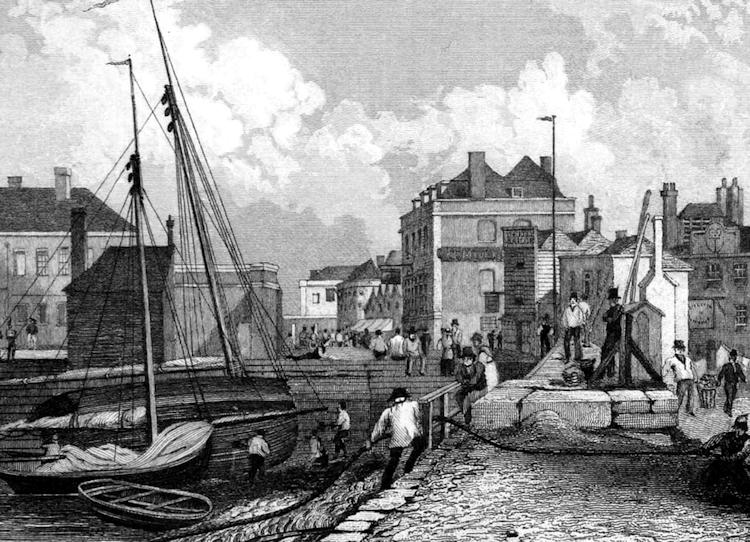
Above print circa 1830. |
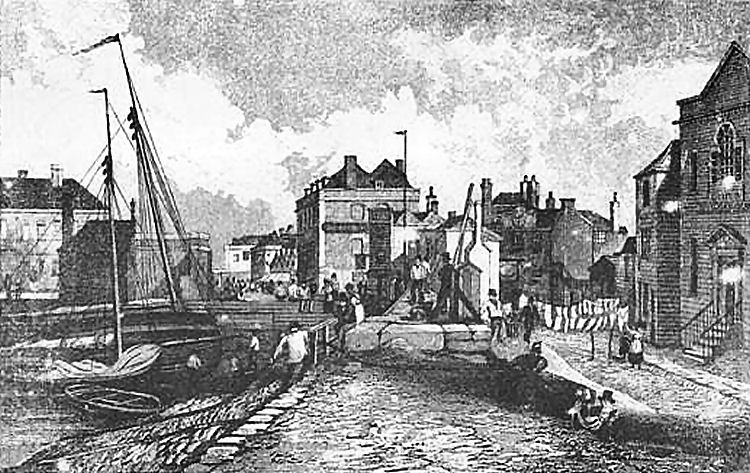
Above print, 1830. |
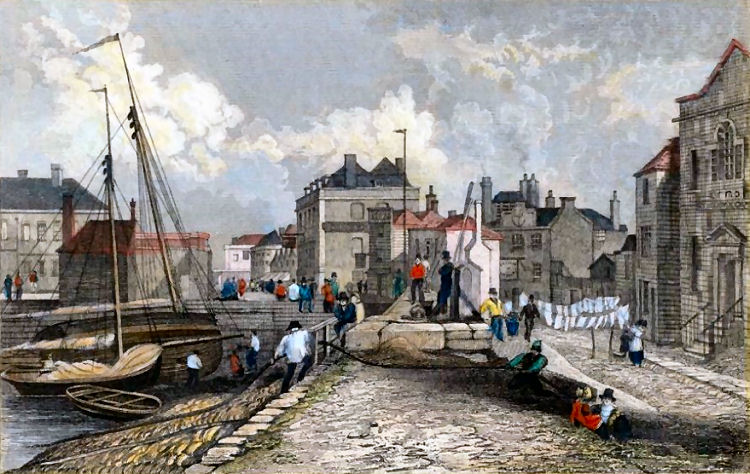
Above coloured print of above, 1830, kindly sent by Rory Kehoe. |
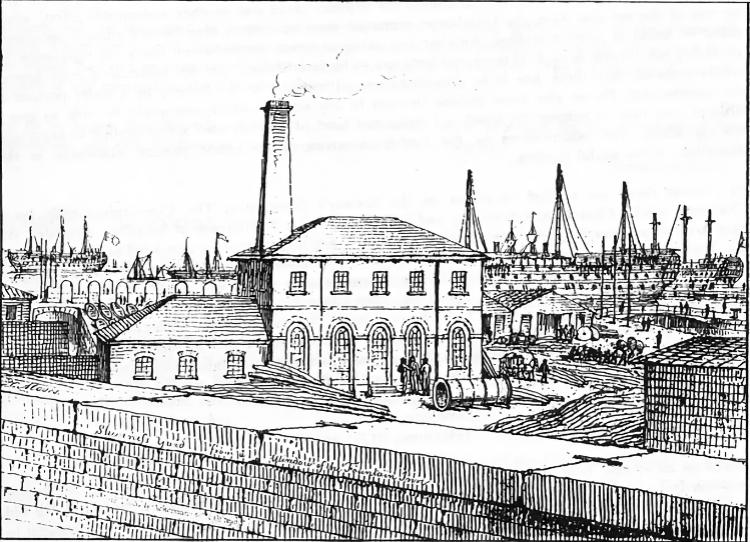
Above print, by H Moses, 1837. |
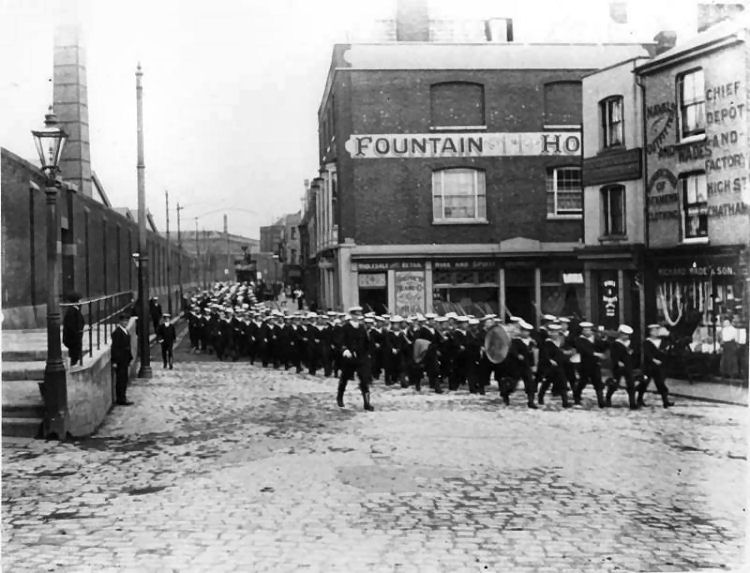
Above photo showing a naval march, date unknown. Taken from
http://www.pbase.com |
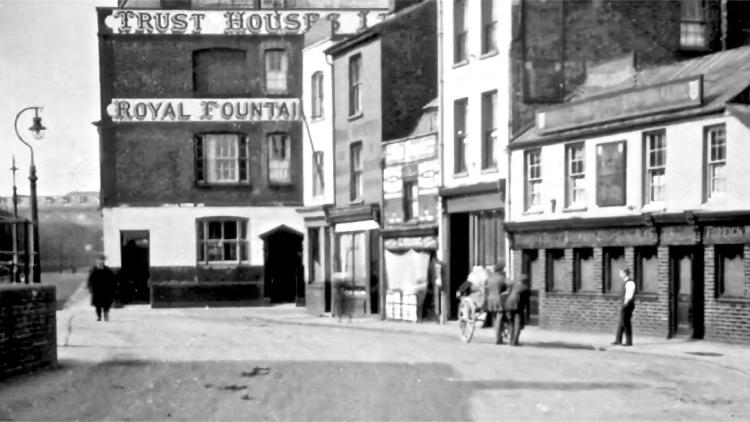
Above photo, circa 1940. |
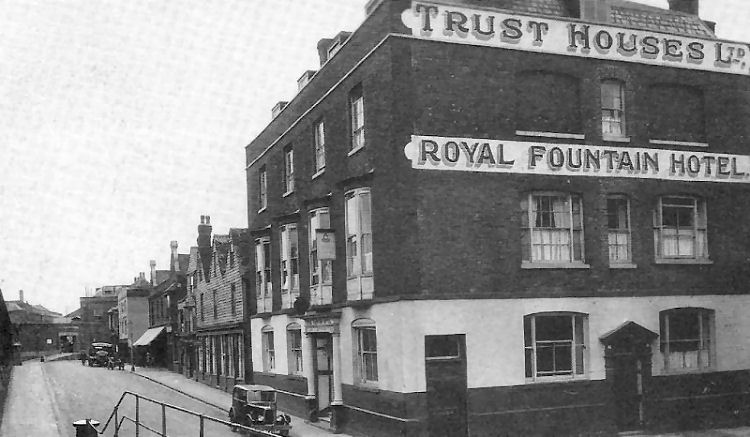
Above photo, 1940s. |
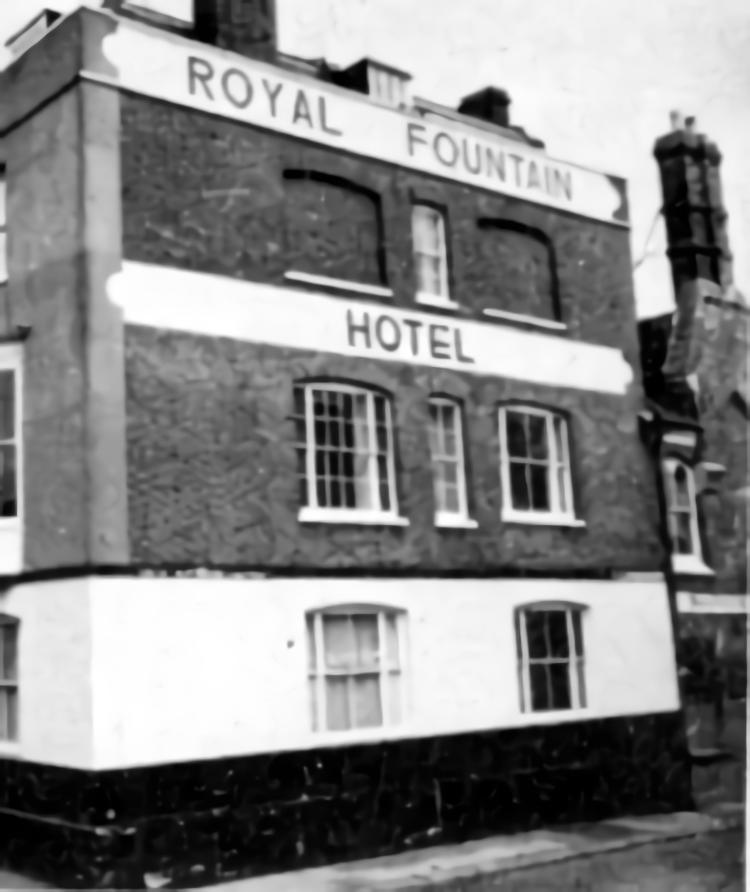
Above photo, circa 1970, kindly sent by Rory Kehoe. |
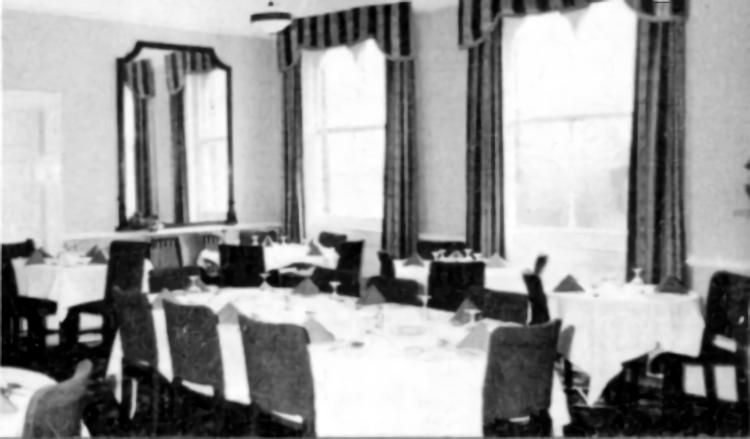
Above photo, circa 1970, kindly sent by Rory Kehoe. |
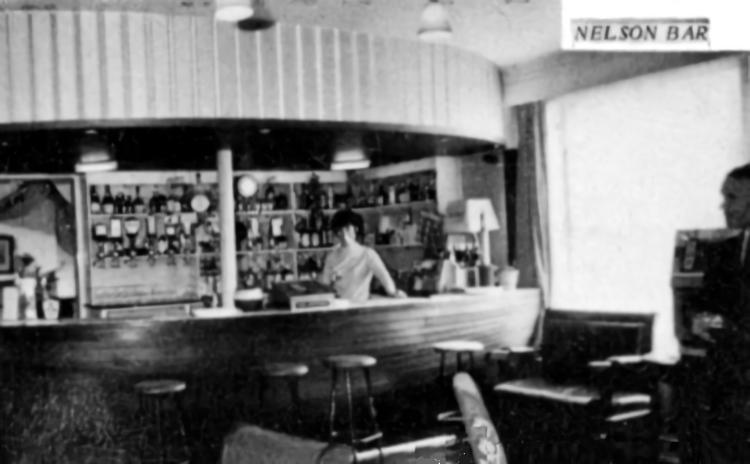
Above photo, circa 1970, possibly showing licensee Ethel Edmunds, kindly sent by Rory Kehoe. |
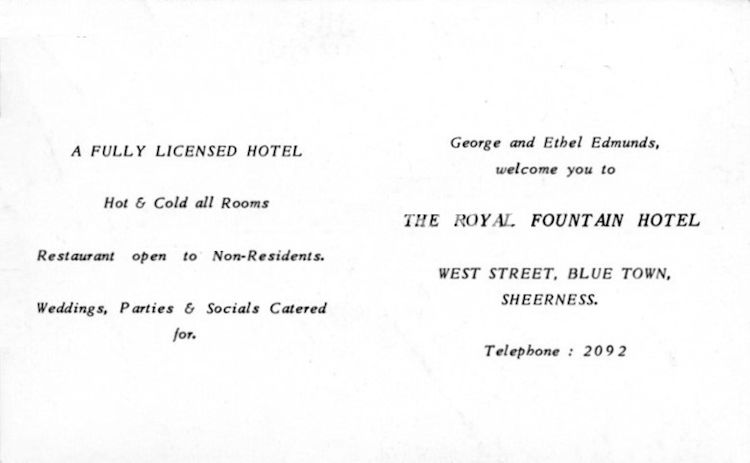
Above card circa 1971, kindly sent by Rory Kehoe. |
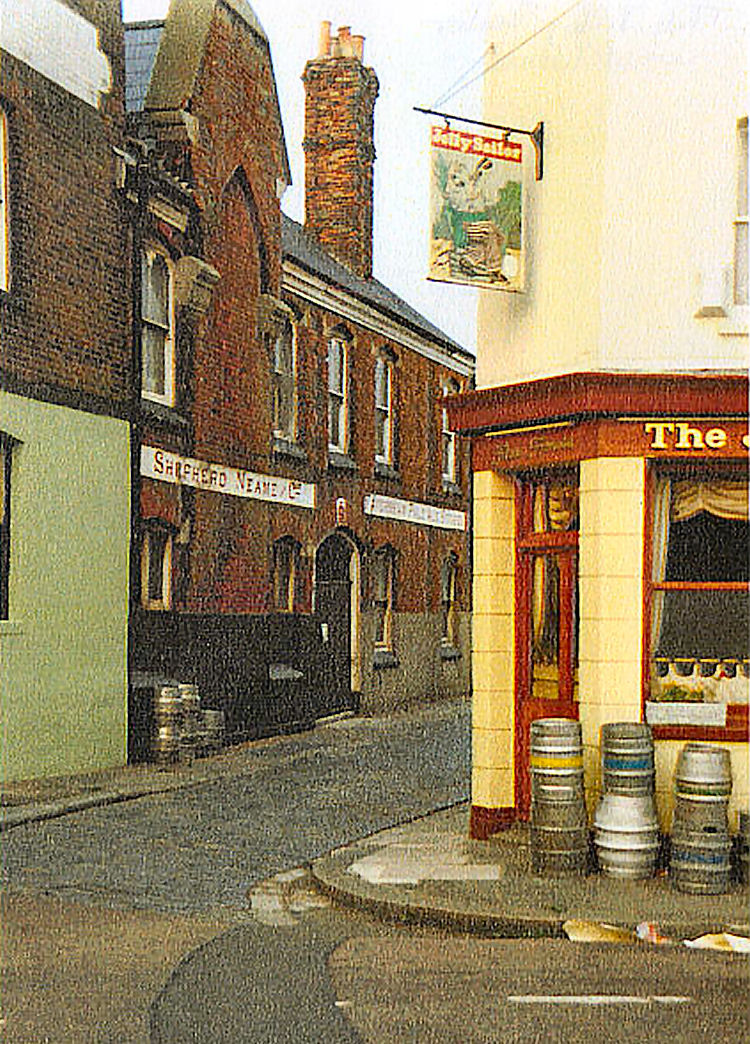
The building on the left showing Shepherd Neame I am told is the "Royal
Fountain." Photo kindly supplied by Joan Thompson. The "Jolly
Sailor" is shown on the right. |
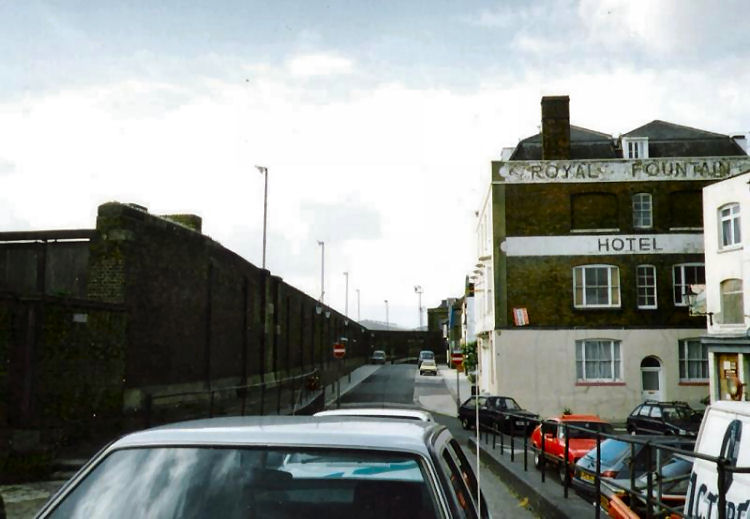
Above photo showing the premises shortly after it was converted into
flats in the 1980s. |
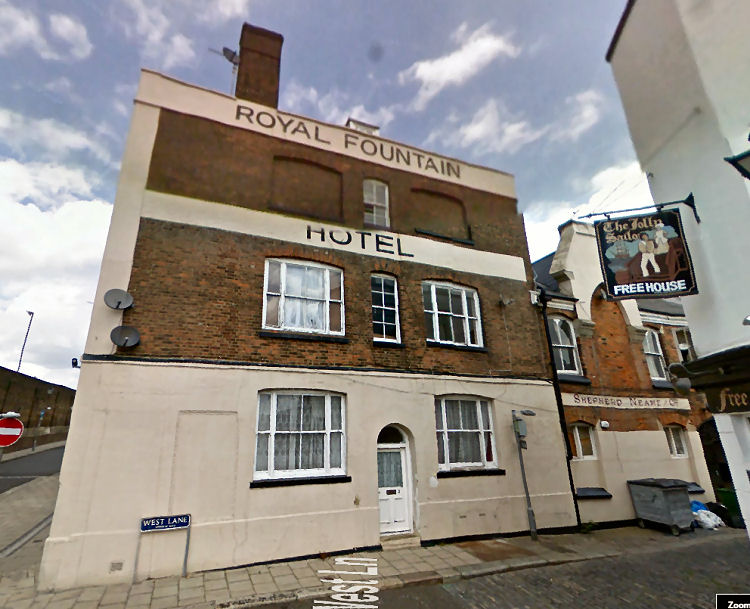
Above image from Google, May 2009. |
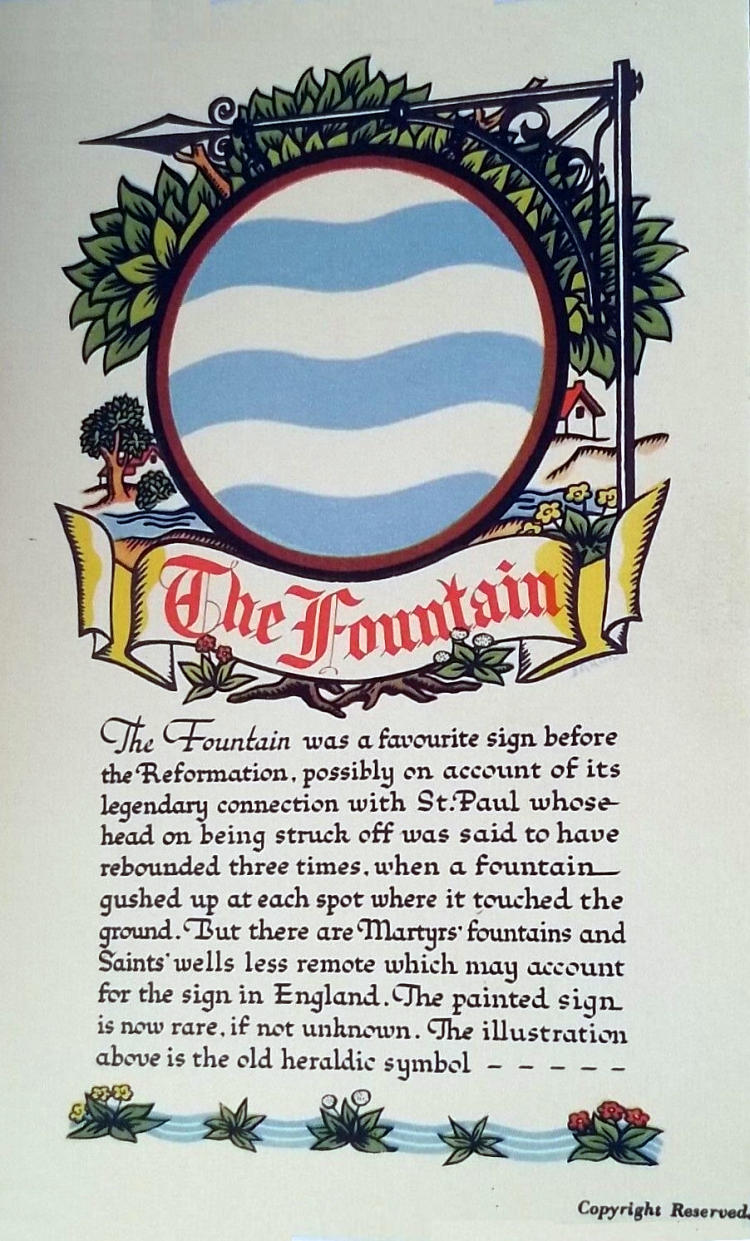
Above picture circa 1948, kindly sent by Rory Kehoe.
Printed on the back of this it says "The Trust House of this sign is
the Royal Fountain, Sheerness, Kent. Trust House Ltd., 53, Short's
Gardens, London. WC2." |
According to Michael David Mirams in his book "Kent Inns and Inn Signs,"
an old Fountain once stood opposite the dockyard gates at Blue Town,
Sheerness.
There is reference to a Fountain Hotel in Bluetown in 1802, and others
dating back to the 1700s, so I believe this was not the first Hotel in the
area with that name. In fact a document found from 1833 says these building
were newly built for a cost of £6,000 about 25 years past making that about
1808.
According to Kent's Pubs and Inns by G. Weaver (Published in 1977), the
book says that "The Royal Fountain was built in 1700 and started life as a
coaching inn".
This building however, was constructed in 1806 by George Clarkson, and it is rumoured that
Lord Nelson stayed here one night inspecting the efficiency of his dockyard before sailing away.
Both George and his wife died in 1812, but I believe his son continued to
run the hotel.
The Fountain Hotel was where the body of James Anthony Higho was
taken after he drowned whilst bathing on a day trip to Sheerness. It's also
where they held the inquest in July 1850 with the jury recommending that a
fence be erected around the creek where he'd died.
Part of the building was built by Shepherd Neame in 1866. The building is
now Grade II listed.
Previous to the building being erected the land was described in 1791 as
'part of a piece or parcel of pasture or fresh marshland containing by
estimation four acres more or less heretofore in the tenure of Henry Lee.'
During the late 1990s the Fountain was a "drugs den", the Police raid
made the South-east T.V. news. More recently, Aug 2010, the ground floor
flat was badly damaged in a fire. I, Paul Skelton, was actually passing it
just before fire was discovered and the police contacted me, knowing that my
van was in the area, asking whether I had seen anything suspicious.
Unfortunately I was unable to help, and knew nothing of the fire till the
next day, when the roads were cordoned off. I was a teacher of technology at
the nearby Oasis Academy at the time.
|
Kentish Gazette, 12 December, 1806.
FOUNTAIN INN, SHEERNESS.
GORGE CLARKSON (late of the "Marlbro’ Head Inn")
returns his most grateful acknowledgments to his friends, and the
public in general, for the very liberal support he has so long
received, and begs leave to inform them, he has, at a very
considerable expense, built the
"Fountain Inn," near the New Pier, Sheerness, which is a roomy
commodious, and elegant house, superbly furnished with upwards of
sixty beds, and every other article of furniture entirely new; and
is now ready for the reception of Gentlemen and Families, who may
please to honour him with their company. The "Fountain Inn" is
situated to command views of the river Thames and Medway, the Noret,
South-End, and all the surrounding country.
G. C. having purchased a large stock of choice old Wine, with the
very best Liquors, hopes, by every attention in his power, to merit
a continuance of their favours.
N. B. Good Stall Stabling, &c. &c.
Packets from Chatham to Sheerness, and back, every tide, at One
Shilling expense.
5th Nov. 1806.
|
|
Kentish Weekly Post or Canterbury Journal. 19 December 1806.
FOUNTAIN INN, SHEERNESS.
George Clarkson (late of the "Marlbro’ Head Inn") returns his most
grateful acknowledgements to his friends, and the public in general, for
the very liberal support he has so long received; and begs leave to
inform them, he has, at a very considerable expense, built the "Fountain
Inn," near the New Pier, Sheerness, which is a roomy, commodious, and
elegant house, superbly furnished with upwards of fifty beds, and every
other article of furniture entirely new: and is now ready for the
reception of Gentlemen and Families, who may please to honor him with
their company. The Fountain Inn is situated to command views of the
rivers Thames and Medway, the Nore, South-End, and all the surrounding
country. G.C. having purchased a large stock of choice old Wines, with the very
best Liquors, hopes, by every attention in his power, to merit a
continuance of their favors. N.B.—Good Stall Stabling, &c. &c. Packets from Chatham to Sheerness, and back, every tide, at one Shilling
expense. |
|
Kent Herald, 8 December 1825.
On Tuesday night, the stables of the "Fountain Inn," Sheerness, were discovered
to be on fire, and but for timely assistance would soon have been a heap of
ruins. The horse of a traveller was injured, and a dog and cat smothered. The
fire is supposed to have originated by the spark or snuff from a candle.
|
|
From the Kent Herald, 10 August 1826.
DEATH.
Aug. 3, Mrs. Rugg, wife of Mr. Rugg, landlord of the "Fountain Tap," Sheerness.
|
|
The Morning Post (London, England), Tuesday, 10 October, 1826.
DREADFUL FIRE AT SHEERNESS.
On Friday morning, about half-past four o'clock, the inhabitants of Blue
Town were alarmed, and thrown into the greatest confusion, by a fire
breaking out with tremendous violence in the stables belonging to Mr.
Clarkson, of the "Fountain Inn." Assistance was promptly rendered, but
the flames had acquired such powerful force, that before they could be
subdued, no less than ten dwelling-houses became the prey of the
devouring element, together with the whole of the stabling and
coach-houses, including five horses, a coach, hearse, post-chaise, gig.
and all their harness, &c. which were entirely consumed. The Officers
and men of his Majesty's ships Brunel and Gloucester, as well as those
front the Dock-yard, exerted themselves in the most praiseworthy manner,
and happily succeeded, with the engine belonging to the Naval
Establishments, in arresting the progress of the calamity, or the
consequences might have proved dreadful in the extreme; as it is, there
is evidently too touch to deplore. We have not heard to what extent, if
any, insurances may have been effected on the property destroyed ; but
by the destruction of the dwellings, several poor families are deprived
of their little all, having barely had time to escape with their lives ;
their situation, it is sincerely to be hoped, will not fail to excite
commiseration in the hearts of the affluent.
|
|
From the Kent Herald, 12 October 1826.
Dreadful Fire at Sheerness.
A large fire broke out in the stables of Mr. Clarkson, of the "Fountain Inn,"
Sheerness, on Friday morning, about 4 o'clock; and in less than half an hour the
whole stack of stables were in a complete blaze; there being at the time a
strong breeze of wind and the houses being built of wood, the fire raged with
inconceivable fury, and the most serious alarm was manifest for the safety of
the town.
Woman and children were running all directions from the fire, many of them with
scarce a vestige of covering. In about an hour after the bursting of the fire, 8
houses in the neighbourhood were in a blaze, and it was not until about this time
that any engine could get to play, the fire still extending till the whole lump
of buildings, about 13 in number, were in flames. By this time there were seven
engines that play on the burning houses, and by the extraordinary and continued
exertions of the officers and men belonging to His Majesty's Ship Gloucester,
the artificers and workman of the yard, and the officers and privates of the
regiment, stationed at Sheerness, the further progress of the flames were
checked. The buildings then on fire continued burning till about half past six,
when they all nearly together, fell in with a tremendous crash, and buried in
their fall the flames in which they had been enveloped. Some valuable property
has fallen a sacrificed to this devouring elements on this occasion; and we
regret exceedingly to state that five horses, one of which was the property of
Mr. Beale, surgeon, of Maidstone, were burned to death; for one of the horses,
Mr. Clarkson a short time since refused and offer of 70 guineas. The post
chaises, mourning coach, Hearse, &c, and a valuable gig, all the property of Mr.
Clarkson, were destroyed. The number of houses injured exceed 20, about 13 were
entirely consumed; they belonged respectively to Messrs. Abraham's, Griffin,
Holloway, Sir Edwin Banks, Randall and others. A considerable part of the
property was ensured.
Too much praise cannot on this occasion be given to the Officers and
men-of-war's men (who were the first on the spot after the alarm) and who were
the same men that rendered such aid to the town of Cronstadt in Russia when on
fire a few months since. Equal praise is due to the officers, artificers, and
workman of the Dock-yard; and to the soldiers, for their mainly conduct during
the fire.
It has not been ascertained in which way it originated; but it is learned it was
the work of some wicked incendiary, from the circumstances of the same premises
having twice before, within the last year, being discovered on fire, neither of
which times any possible surmise as to the manner in which it originated could
be made. A select meeting of the inhabitants was held the same evening, to
consider the best means of alleviating the sufferings of the poor occasioned by
this calamity fire, a subscription was entered into, and the whole needs to be
canvased by respectable gentleman for the purpose of afford in every relief to
the unfortunate sufferers.
|
|
From the Kent Herald, 15 February 1827.
On Saturday last, an inquest was held at the public house, "King's
Ferry," on the body of a female, who had committed suicide at that place the
preceding Wednesday. The deceased was quite a stranger, and of very respectable
appearance. She had been staying a day or two at the house above mentioned on
pretence of waiting for some person whom she said she expected. It also appeared
she had been staying a few days at the "Fountain
Hotel" Sheerness, where she represented herself, as the wife of a
merchant Captain, and that she was to wait her husband's arrival; however, no
such person came, and she left without paying her bill, and proceeded to the
house where she committed the rash act.
It appeared that an innkeeper of Milton, had been deceived by the
representations of the same individual about a week before, and hearing of her
being at "Kings Ferry,"
he proceeded and demanded the amount of his bill, which not being complied with,
he insisted on her going with him saying he had a warrant in his pocket.
The unfortunate woman absented herself a few minutes, and returning said she
had taken poison, and they might do as they pleased with her. She soon became
alarmingly ill and died in about half an hour, before any medical assistant
could be procured. It appeared she had taken a quantity of Oxalic Acid, which
she purchased at Sheerness.
From the evidence of several persons who have recently witnessed her
demeanour, a verdict of insanity was returned.
The parish of Word have liberally provided for a decent funeral suitable to
the apparent respectability of the individual whose real name is at present
unknown.
Another account from a correspondent, states the name of the unfortunate
young woman to have been Sheepwash; that she was a native of Faversham; and she
had cohabited with a military officer for some time past.
|
|
The Standard (London, England), Friday 3 August, 1827; pg. (1) Issue 65.
EXTENSIVE FIRE AT SHEERNESS.
In yesterday's paper, there was a paragraph stating that a destructive
conflagration had broken out at Sheerness. The following particulars of
this distressing calamity have been since communicates by a gentleman
from Sheerness:- It appears that on Monday night, between the hours of
11 and 12, a fire broke out in a small house adjoining the "Fountain
Tavern," opposite to the dock-yard, in the Old Town. At the time above
stated the flames were first discovered by a watchman, who is stationed
at the entrance to the dock-yard, and who immediately gave the alarm. A
scene of great confusion ensued, and such was the rapidity with which
the flames spread, that the inmates of the house in which they broke out
had scarcely any time to quit the premises; indeed, one little girl
belonging to the family is said to have fallen a victim to the fire, as
nothing has been heard of her since the night in question, and she
having slept in one of the attics, not a doubt can be entertained of her
having perished. For a considerable time it was apprehended that the
"Fountain Tavern" would fall prey to the flames, and the whole of the
persons who were residing there were compelled to make their egress as
speedily as possible. The household furniture and effects were removed
from the premises. At this time most of the men from the dock-yard were
on the spot, and rendered every assistance in their power; but we regret
to say that, owing to its being low tide at the time, for upwards of an
hour and a half no water could be procured. On account of this
circumstance the flames spread rapidly, and great fears were for a long
time entertained that the whole of this part of the town would be
consumed. There were now present from fifteen to twenty engines, some of
which, from the indefatigable exertions of the firemen, were able to
play with effect. Some of the most respectable of the towns' people
hastened to the spot, and used their utmost exertions to arrest the
progress of the evil; but for a considerable time their efforts were in
vain, except as to the humane assistance which they afforded to the
persons who were thus calamitously deprived of their homes. By two
o'clock in the morning the whole of one side of the street, consisting
of 23 houses, was entirely destroyed; still not the slightest
probability appeared of subduing the fire. Nothing could exceed the
consternation of the inhabitants of the town at this moment. They had
all risen from their beds, and many of them appeared in the streets
almost naked. The flames continued to rage; and, notwithstanding the
united efforts of the firemen and the inhabitants, who had crowded to
the spot, the fire was not completely subdued until between seven and
eight o'clock on Tuesday morning, when no less (says an informant) than
62 houses were consumed.
The description of property lost was chiefly what is termed "slops and
marine stores," and it is gratifying to be informed, that much of this
was insured; but as all the houses were inhabited by a class of persons
among whom a neglect of insurance is a common failing. there is reason
to fear that some of the occupiers, at least, must have been sufferers
to the extent of their little all. The rapidity with which the flames
spread may be entirely attributed to the want of water, and to the
material (wood) of which most of the houses were composed.
|
|
From the Maidstone Gazette and East Kent Courier, 7 August, 1827.
Dreadful fire at Sheerness.
On Tuesday evening, a dreadful and most destructive fire broke out at
Sheerness, and the consequences have been most calamitous, a large part
of Blue Town having fallen prey to the devouring element. The fire broke
out in the premises of Mr. Clark, and from the combustible nature of the
houses, being principally built of wood, they continue to ignite one
after the other until forty-five dwellings were burnt down.
The flames were first discovered by a watchmen, who is stationed at the
entrance to the dock-gate, and who immediately gave the alarm. A scene
of great confusion ensued, and such was the rapidity with which the
flames spread, that the inmates of the house in which they broke out had
scarcely time to quit the premises. For a considerable time it was
apprehended that the "Fountain Tavern" would fall a prey to the flames,
and the whole of the persons who were residing there were compelled to
make their escape as speedily as possible. The household furniture and
effects were removed from the premises. At this time most of the men
from the dockyard were on the spot, and rendered every assistance in
their power; but we regret to say that, owing to its being low tide at
the time, for upwards of an hour and a half no water could be procured.
On account of this circumstance the flame spread rapidly, and great
fears were for a long time entertained that the whole of this part of
the town would be consumed. There were now present from 15 to 20
engines, some of which, from the indefatigable exertions of the fireman,
were able to play with effect. Some of the most respectable of the
townspeople hastened to the spot, and used their utmost excursions to
arrest the progress of the evil; but for a considerable time their
efforts were in vain, except as to the humane assistance which they
afforded to the persons who were thus calamitously deprived of their
homes.
By 2 o'clock in the morning, the whole of one side of the street,
consisting of 23 houses, was razed to the ground, and still no
probability of the fire being subdued.
Nothing can exceed the consternation of the inhabitants of the town, the
whole of them were driven from their beds, the majority of them being
nearly in a state of nudity; but not withstanding the united exertions
of the fireman and townspeople, the fire was not got under until between
7 and 8 o'clock on Wednesday morning, when no less than 62 houses were
consumed. The description of property lost was mainly what are termed
"Slops," or fitting out warehouses for sailors. Several of the firemen
and others received some serious injuries.
|
|
From a publication dated 1833.
The Fountain Inn, at Sheerness.
MR. MUSGROVE is authorized to SELL by PUBLIC AUCTION, at the Auction
Mart, on Thursday, October 17, at 12, in 1 Lot, without reserve, a
valuable and important FREEHOLD ESTATE, comprehending those extensive
premises known as the "Fountain Hotel," Tavern, and Wine-vaults, with a
very lucrative tap adjoining, most eligibly situate, contiguous to the
pier at Sheerness, in the Isle of Sheppy, in the county of Kent. This
desirable freehold property was erected by the vender’s father about 25
years ago, at a cost of nearly £6,000. The buildings are now in perfect
repairs the interior arrangements are of a superior order, and well
adapted to the conducting with facility a first-rate business.
Considering the beneficial Government alterations in the neighbourhood,
together with the liberal spirit lately manifested by the inhabitants to
obtain a cheap and expeditious conveyance to and from London daily, the
establishment of gas, the erection of a new church, and other local
improvements, added to the delightful scenery of the Isle of Sheppy, it
may be reasonably anticipated that Sheerness will ultimately become a
favourite watering-place. The present returns are considerable, and have
been progressively increasing for the last few years. Every change of
the Government shipping in this district adds materially to the
business, and in time of war the property produced a clear rent of £800
a year. Printed descriptive particulars may be obtained at the house;
the "Ship," Chatham; "Crown inn," Rochester; "Royal hotel," Southend;
"Pier hotel," Gravesend; of Mr. Ashley, solicitor, Old-street-road; and
at Mr. Musgrove’s offices, 5, Austinfriars, Old Broad-street, London.
|
|
South Eastern Gazette 31 December 1833.
DIED.
Dec. 28, at Blue Town, Sheerness, Elizabeth, wife of Mr. Clarkson, of
the "Fountain Inn."
|
|
South Eastern Gazette 29 November 1836.
DEATHS
Of a consumption, Mr. William Norly, of the "Fountain Tap." |
|
From the Kentish Gazette 30 October 1838.
BIRTH.
At Braganza Hall, St. Mawes, Cornwall, the lady of Henry Jenkins,
esq. daughter of the late Mr. William Baker, of the "Fountain Inn,"
Sheerness, of a son.
|
|
From the Kentish Gazette, 28 May 1844.
AN ATTEMPT AT MURDER AND ROBBERY.
At the petty sessions held in the Guildhall, Rochester, on Friday
afternoon, before the mayor. Larkin Allen, esq., and Edmund Buck, esq.
and Edward Manclurk, esq., two of the borough justices, three watermen
from Sheerness were brought tip in custody of Edward Buckhurst, a
constable of Minster, in the isle of Sheppey, charged with robbing a
sailor, and attempting to murder him, by throwing him into the river
Medway. The men, on being placed in the dock, gave their names and ages
as follows:—
Edward Monck, 29, Chas. Henry Jest 26, and George Chapman,
35. None of the prisoners could read or write. The hall was crowded with
spectators. Several gentlemen were accommodated with seats on the bench.
Abraham Davis, the sailor who was ill-treated, was brought into court by
the boatswain and the quarter-master of her Majesty's ship Ocean, lying
off Sheerness. His throat was plastered up, and he had a bruise on the
right side of his temple. On being sworn, he said that on Wednesday, the
22nd inst., he was paid off from the Vernon frigate, at Sheeness, and
received five sovereigns. He went on shore about two o'clock p.m., and
entered a public house facing the entrance on to Sheerness pier. The
prisoners Monck and Jest were there, and he asked them what time the
steamer started for Loudon. Monck immediately took away his bag of
clothes, followed by the prisoner Jest; he followed them. They went
under the pier, and entered a boat, which he also got in, the prisoners
saying that they would lay off and wait the arrival of the steamer. When
they got him into the river, instead of waiting, they pulled the boat
into the middle of the Medway, when the prisoner Jest demanded from him
a sovereign as his fare, and as he did not know what to do, he gave him
one. Monck, the other prisoner, then demanded a sovereign, and he told
the prisoner he should not get one out of him, but to satisfy the
prisoner he gave him 3s. The prisoners could see that he had another
Sovereign. Monck said that was not enough, and pulled the boat to the
opposite shore—the Isle of Grain. When about three lengths of the boat
from the shore, one of the prisoners dropped the anchor. During the time
the prisoners were rowing to the Grain shore, Monck swore that if he did
not give him more money, he would throw him overboard. When the
prisoners cast their anchor he begged of them to put him ashore. Both
prisoners immediately seized hold of him and threw him overboard, also
his bag of clothes. He arose and caught hold of the gunwale of the boat.
The prisoner Monck desired Jest to knock his brains out. He then
received some blows on the head, and also a cut in the neck from some
instrument. His neck bled very much. He thought the prisoners wanted to
strangle him. Being much frightened he had not time to look which of the
prisoners had the instrument, as he hung on the gunwale of the
prisoners’ boat. A boat’s crew came up and took him out of the river. He
had been drinking, but was sober.
Stephen Young, seaman on board the Ocean, lying at Sheerness deposed
that he entered the “Crown and Anchor” public-house about two o’clock in
the afternoon of Wednesday, when he saw the complainant, who asked him
the hour the steamer left for London. He saw the prisoner Jest seize the
sailor’s bag, and run off with it round the corner of the “Fountain
Inn;” he told the sailor to be after it, or he would lose it. After that
he saw the two prisoners with the sailor; one of the prisoners had the
bag; and he saw the three go under the pier and enter a boat. Feeling
satisfied that all was not right, when he got on board the Ocean he
mentioned his suspicions to the officer on watch. The Loudon steamer
came alongside the pier head about a quarter of an hour after the
prisoners had taken away the man.
Thomas Adams, boatswain and supernumerary on board the Ocean and John
Church, quartermaster of the same ship, deposed that they saw the boat
pass under the bows of the Ocean. The prisoner Monck was pulling, and
Jest was silting by the side of the sailor. The boat had a small sail
up, and they proceeded towards the west shore. With a glass they saw the
boat let go its anchor, and the men on hoard seemed hustling one
another; when an order came from Capt Fleming to immediately man the
galley, and proceed to the spot. They took six men with them. We saw the
violent assault made upon the sailor. We succeeded in getting the man
into our galley, and captured the two prisoners with their boat. The
sailor’s neck was running with blood. We towed the prisoners to the
Ocean, and they were had up before the commander. The wounded sailor was
attended by the doctor of our ship, who dressed the wound. The sailor
was neither drunk or sober: he gave witness Adams a post-office order
out of his pocket, as it was wet, also a sovereign, and one shilling in
silver.
To a question from the Court, the wound in the neck could not have been
inflicted by a boat hook; it must have been done by a sharp instrument.
Monck and Jest denied that they intended to murder the man. If they had
had such an intention, they could have taken him further out, from the
eyes of every body. The man was so drunk that they could not keep him in
the boat, and ho fell out of his own accord.
Monck and Jest were fully committed for trial. Chapman was discharged
for this offence, but was detained on a charge of assisting the two
prisoners in their escape, after they had been given into the custody of
a peace officer by the Commander of the Ocean. It appeared from the
evidence of the constable, Buckhurst. that when the two prisoners were
given to him, he handcuffed them and they then went into the “Jolly
Sailors,” opposite the pier, when the prisoner Chapman held a
conversation with Monck and Jest, and both prisoners darted out of the
house and entered a boat, in which the prisoner Chapman entered, and
rowed off with them towards the western shore of the Medway. The
prisoners were pursued by the galley, manned from the Ocean, and
captured and brought back to the Ocean, where they were confined, The
officer stated that he called upon several persons to assist him when
they escaped, but everybody refused; and his life was threatened if he
took them. One man, a relative of the prisoners, drew a knife, and
threatened to murder him if he took them.
The Court said such a resistance to the civil authorities they never
heard of, especially under such circumstances, and fully committed the
prisoner Chapman for trial.
|
|
Dover Chronicles 30 January 1847.
Sheerness.
On the 20th inst., an inquest was held at the "Fountain Inn," before
Mr. Hinde, on the body of Thomas Bowes, age 22 years, belonging to
the Britannia smack, of Milton, who was drowned the night before, at
the pier.
It was conjectured that the deceased, going down to his boat,
slipped off the side of the pier, and although the water was not
more than 3 or 4 feet deep at this spot, he sank before assistance
could reach him.
Verdict:- "Accidentally drowned."
|
|
Sheerness Guardian 1 January 1859.
“FOUNTAIN” NAVAL AND COMMERCIAL HOTEL, (opposite the Pier,) SHEERNESS. R. POTT,
BEGS to intimate to his Friends and the Public generally, that the
greater part of the alterations on his premises having been
completed, securing thereby a greater facility for business, he is
prepared to supply Families and private individuals with GENUINE
WINES, SPIRITS, & LIQUORS, of every kind, at prices that will stand
comparison with any house in the trade.
At this Hotel every comfort will be found, combined with the
strictest attention and economy.
Am excellent Billiard Table with First-rate accommodation.
|
|
Sheerness Guardian 1 October 1859.
Local Intelligence.
Throwing Night Soil Over The Pier.
The following case was heard last week at Rochester.
George Pollard, a town carter, was charged, on the information of
Mr. J. Beal, surveyor to the commissioners of Sheerness-pier, with
having thrown a quantity of night soil into the river Medway at
Sheerness pier. Mr. R. Prail, junr, appeared for the defendant.
Job Mummery, a night watchman at the Sheerness railway station,
stated that about one o’clock on the morning of the 14th July, he
saw the defendant approach the pier from the "Fountain," and throw
about twelve or fourteen buckets of night soil into the river. The
tide was then ebbing.
Cross-examined by Mr. Prail:— The commissioners of the pier had
instructed him to look out to see what nuisances were emptied over
the pier. Defendant came from behind the "Fountain" tavern.
Mr. Prail said the evidence of the complainant was unsupported.
Several witnesses would be called to prove that the defendant was
not in Sheerness at the time, but in London, and that three months
ago defendant discontinued his business of a nightman and disposed
of it to his son. He therefore trusted the magistrates would dismiss
the summons and award the costs, as the defendant had been summoned
before the Sittingbourne magistrates for this offence, but the summons
was dismissed, as there was no jurisdiction.
William Pyle, John Mills and John Hughes, were then called in
support of Mr. Prail’s statement. Mills, who is a licensed
victualler, and formerly kept the "Fortune of War," gave, as a
reason for remembering the date, that on that day he had ordered a
quantity of porter from Meux’s stores, he produced the permits of
the porter delivered, and said he was quite prepared to swear that
the permit of the 14th was that on which the defendant went with him
to Woolwich.
Mr. Coles after examining the note, said to him it appeared as if
the date had been altered.
Witness said he had not altered it, nor was he aware that any one
else had.
Mr. Levy said the note would remain with the magistrates, and the
counterfoil at Meux’s would be examined, to see if the dates
corresponded.
Mr. Coles:— Because if the date has been altered perjury has been
committed.
The magistrates, after deliberating some time, dismissed the case,
but refused to allow the defendant the costs.
[With reference to the evidence of Mills, reported above, Mr. Coles
called the attention of the bench to it; he had no doubt perjury had
been committed, the figures on the document produced in court having
been altered. The other members of the bench expressed the same
opinion, and directed the altered delivery note to be impounded,
with a view to other proceedings being taken.]
|
|
Sheerness Guardian, 7 January, 1860.
‘FOUNTAIN’ NAVAL AND COMMERCIAL HOTEL, (Opposite the Pier,
Sheerness.)
R. POTT, RESPECTFULLY begs to inform the Gentry, Visitors, and
Inhabitants of Sheerness, and the Isle of Sheppey. that he has now
completed the alterations in his Establishment, securing thereby
greater facilities for business and comfort for visitors. He is now
prepared to supply Families and individuals with GENUINE WINES,
SPIRITS, &c., Of every description.
At this Hotel, will he found every comfort, combined with the
greatest attention and economy.
|
|
Sheerness Guardian, 25 February, 1860.
POLICE CASES.
When Gladstone, was charged by Sergeant Ovenden, with being a
disorderly prostitute and breaking a window at the "Fountain Hotel,"
Sheerness, between the hours of 11 and 12 o'clock on the night of
the 14th instant. The charge being fully proved, the magistrate
sentenced her to be imprisoned and kept to hard labour for 21 days
with an intimation that she would be dealt with still more severely
if again brought before him.
|
|
Sheerness Guardian, 14 April, 1860.
Police Cask.
(Before Edward Twopenny, Esq., at Sittingbourne, Monday April 9th,
1860).
Sarah Baker, an ex-nymph of the pave, who stated that she now lived
under the protection of a Royal Marine, was charged with wilfully
breaking a plate glass window, at the "Fountain Hotel," thereby
committing damage to the amount of 18s. on Saturday afternoon on the
7th of April, 1860.
It appeared from the evidence that the prisoner and another woman,
named Keating, went into the bar at the "Fountain Hotel," on the
afternoon in question, and as the proprietor would rather have their
room than their company, they were ordered to leave, and were
ultimately turned out by a young man named Munday, in the employ of
Mr. Pott. The prisoner resisted and an she was being pushed out at
the door, she broke the window, by wilfully knocking her head
against it.
Ordered to pay £1 16s 6d; damages, costs and penalty included, or be
committed to prison.
Prisoner agreed to pay in a fortnight.
|
|
South Eastern Gazette, 19 June, 1860.
DEATH.
On the 11th inst., Mr. George Clarkson, of the "Bell and Lion Inn,"
Mile Town, for many years landlord of the "Fountain Hotel," Blue
Town, aged. 68.
|
|
Sheerness Guardian, 17 November, 1860.
George Alexander, a stoker in the Steam Reserve at Sheerness
Harbour, was brought up before E. Twopenny, Esq., on Wednesday, in
charge of Sergeant Ovenden, for having on the previous night
committed wilful damage to the amount of 30s. At the "Fountain Inn
Tap," whilst in a state of intoxication. From the evidence of the
prosecutor, it appeared that the prisoner went to the housing
question in a state of inebriety and after calling for a pint of ale,
began to quarrel with a Marine who was present, which ensued in the
prisoner making a furious onslaught upon him. The prosecutor ejected
him from the premises when he became excessively violent and smashed
the shutters and windows of the front door, doing damage to the
amount specified. He was then given into custody. The evidence was
corroborated by Mr. J. Jeffries and the charge fully substantiated.
After a suitable reproof from the Bench, the prisoner was fined £2
10s. including costs, or in default, to be committed for three
weeks.
|
|
From the Southeastern Gazette, 9 January 1866.
Fatal Boat Accident.
On Tuesday evening an inquest was held at the “Fountain Hotel,” by Mr.
T. Hills, coroner, on the body of Elizabeth Kisby, a child nearly four
years old, who was accidentally drowned on the previous Wednesday
evening, through the upsetting of a boat.
Thomas William Kisby, master-in-charge of the Government lighter
Sheerness, No. 15, stated on Wednesday evening last, I, my wife, eldest
daughter, and a son, arrived at the Sheerness station about half-past
eight, after having been to see my father, who died that night at
Queenborough.
I went to the Pier to take a boat to go to the lighter, which was lying
in the river. A young man named Cheeseman brought a boat from the
Fearless (tug boat), to take me on board my vessel. It was near low
water, and I had to go to the end of the pier. I and the three children
got into the boat, and William Cheeseman was helping my wife in, but
she, instead of stepping on to the thawts, stepped on the gunwale of the
boat, which caused it immediately to capsize, and turn us all into the
water. The men on board the Fearless, hearing us call, came to our
assistance, and we were all got out of the water except deceased, who
could not be found. The boat was an ordinary dingy commonly used for the
purpose. The gunwale of the boat was nearly 4ft. below the landing
place. William Cheeseman, a seaman on board the Fearless, confirmed this
statement, adding — when we were all thrown into the water, I almost
immediately righted the boat, and held on to it, the others holding on
to me, and in about five minutes the boat from the Fearless came to our
assistance, just as I was almost exhausted from my efforts to keep us
all up.
The jury returned a verdict that deceased was accidentally drowned, and
expressed their admiration of the conduct of Cheeseman in hanging to the
boat in the manner he did, and thus saving the lives of the unfortunate
family who were clinging to him.
|
|
From the Southeastern Gazette, 10 July 1866.
Petty Sessions. (Before the Rev. G. B. Moore and Sir John Croft, Bart.)
C. Hicks, barman at the “Fountain Hotel,” Sheerness, was charged with
assaulting an Irish tramp named Sullivan, at the bar of the above house,
on the 18feh June. Mr. Wates, of Sheerness, appeared for the defendant,
and called witnesses to disprove the charge. The Bench dismissed the
case.
|
|
From the Whitstable Times and Herne Bay Herald, Saturday 12 January, 1867. Price 1d.
Michael Phair, a seaman belonging to H.M. Lizard, lying at Sheerness,
pleaded guilty to a charge of assaulting Mr. A. W. Howe, of the
“Fountain Hotel,” Sheerness. Fined £3 9s. including costs, in default six weeks hard labour. |
|
From the Whitstable Times and Herne Bay Herald, Saturday 19 January, 1867. Price 1d.
SITTLNGBOURNE. PETTY SESSIONS. Monday.
(Before J. D. Dyke, Esq.) Henry Fenton, a "gentleman” who declined to give his address, was
charged with stealing two leather bags, with their contents, from the
“Fountain Hotel,” Sheerness, on the 11th inst. George Sydney Carver, a commercial traveller, said:—I live at No. 6,
Biggerton Terrace, Maitland Park, Haverstock Hill. On the 11th inst. I
went to the “Fountain Hotel,” Sheerness. I had a feather bag containing
wearing apparel, and a case containing samples of tobacco. I placed them
in the hall of the “Fountain,” where luggage is usually placed. I saw
them safe a little after 5. About half-past six I missed them and gave
information to the police. The leather bag now produced, and which
contained 9 pocket handkerchiefs, 4 pairs of socks, two shirts, one pair
of drawers, one box of collars, one cap, one clothes brush, two hair
brushes, two pieces of soap, one box of scent, one meerchaum pipe and
case, and one account book is the one I lost, as is also the leather
case containing ten canisters of tobacco (with about a quarter of a
pound of in each). The prisoner is an entire stranger to me. The bag has
been searched, and a scent bottle containing benzine is missing. Paper
was torn off some of the things. The lock was not broken. Eliza Howe, said:- I reside with my father, who keeps the “Fountain
Hotel,” Sheerness. I saw the prisoner come into our house about five
o'clock in the afternoon, of Friday, the 11th January. I asked if he
wanted a bed, and be said, “Yes.” He asked where the coffee-room was,
and I showed him in. He had the leather bag now produced in his hand,
and took it into the coffee-room with him. He had some gin and water,
which the waiter took in, and I did not see him afterwards. I am sure
that was the bag prisoner took into the coffee-room with him. Henry Kent, a guard on the Sheemess branch of the London, Chatham, and
Dover Railway stated:- The prisoner was a passenger by the 7.40 train
from Sheerness on the 11th January inst. I saw him cross under the line
at Sittingbourne for the up platform. He had the black leather bag and
leather case now produced in his hands. I detained him, and handed him
over to Sergt. Noakes. Prisoner, when asked if he had anything to say, stated as follows:- “I
admit taking the bags, I plead guilty to that, but I was stupid with
drink at the time. I left my own bag behind me at the Hotel. I did not
take the bag here in the coffee-room. It was my own bag.” Committed for trial at the next Quarter Sessions. |
|
Kentish Gazette, Tuesday 5 February 1867.
Sheerness. Sudden Deaths.
On Tuesday an inquest was held at the "Fountain Hotel," on the body of
John Sosby, aged 53, of Blue Town. It appeared that deceased, when drunk,
fell down stairs and cut his head, but did not injure the skull. He went
to bed, and talked quite rationally, but shortly afterwards turned over
on his side and appeared to be going to sleep; before a medical man
could be called he expired. Mr. Stride, surgeon, on his arrival stated
that deceased died from disease of the heart, accelerated by the fall.
Verdict accordingly.
|
|
From the East Kent Gazette, Saturday, 9 March, 1867.
Hotel Robbery at Sheerness.
Henry Fenton, 32, engineer, a man of respectable appearance and
deportment, pleaded guilty to stealing a leather bag and a number of
articles, value in all, £5, the property of George Sydney Carver, from
the "Fountain Hotel," at Sheerness, on the 11th of January.
Mr. Biron had been instructed to prosecute, and he made a short
statement of the facts.
From this it would appear that a number of things, the property of a
commercial traveller, was stolen from the above hotel. When apprehended
prisoner had what he called a skeleton portmanteau, which is very
commonly used by hotel robbers for the carrying off of property; and he
also had two bladders, which it appeared were used when distended to put
in the bag to make it look as if he had luggage inside.
Prisoner said he had a witness to character, but on his name being
called no answer was returned.
He said it was his first offence, and having given the Court no trouble
by pleading guilty he hoped his Honour would be lenient with him.
The Chairman, in passing sentence, said the crime was one of
considerable magnitude, and prisoner was committed for 9 months' hard
labour.
|
|
Maidstone Telegraph, Saturday 13 November 1869.
Terrible explosion at Sheerness. Coroner's inquest.
The enquiry into the death of the 11 men who were killed by the
explosion of a boiler on board H.M.S. Thistle, on Wednesday last, was
opened at the "Fountain Hotel," Blue Town, Sheerness, yesterday
(Friday), before Mr. T. Hills, coroner for West Kent, and a respectable
jury, over whom Mr. C. Polson was chosen foreman. The Coroner in opening
the proceedings, impressed upon the jury the necessity of not listening
to the rumours and reports which were afloat in the town regarding the
cause of the accident, but to be guided by the scientific evidence which
would be brought before them during the course of the inquiry. The eight
bodies, which lay beneath the gun battery at the Naval Barracks, viz.,
Messrs. Roberts, Scorrer, Smithers, and Knight, engineers; John Daer,
fitter; Robertson, leading stoker; and John Timson and Lawrence,
stokers, were then viewed, after which the whole of the party were
conveyed to the Thistle, which lay moored of the dockyard, in two steam
launches, which were placed at their disposal by Capt. the Hon. A. A.
Cochrane, C.B., and every facility was rendered to the coroner and the
jury by the government officials, to further the investigation into the
cause of the accident. The engines and the boilers of the ship were
inspected, and the hole in the boiler which exploded fully explained to
all present. The company then return to shore and viewed the bodies of
Messrs. Mason, engine fitter, and Whalebone and Anderson, engineer
students, which lay at the Garrison Hospital. On their return to the
"Fountain," there were present on behalf of the Admiralty, Mr. Arnold,
From the firm of Messrs. Essell, Knight, and Arnold, admitalty
solicitors: Mr. Lindsay, from the office of the Lords of the Admiralty;
Mr. Murray, the Admiralty surveyor of factories and consulting engineer;
and Mr. Wright, the Admiralty engineer.
Mr. Walter Wilson Williamson, chief inspector of machinery at Sheerness,
was the first witness examined. He said that he knew nothing of the
cause of the accident. He was conducting the trials of the ship at the
Maplin Sands on Wednesday, and while on deck to time the runs, he heard
a puff about 4.34, and on turning round saw that steam was escaping in a
large mass from the engine room. It was his impression at first that one
of the steam pipes had burst in the engine room, and he thereupon sent a
leading stoker to ease the safety valves, and with the assistance of
another stoker the men lashed up the levers of the valves so as to let
the steam escape. He then had the large hatch removed from over the
engine room and in a few minutes the men went below and brought up on
deck the wounded, dying, and dead.
John Edgar, engineer student, the only person alive who was present in
the engine room at the time of the accident, said that the ship was
about starting on the third mile with her high-pressure engines, when he
saw a flash of light or flame issue from out of the stokehole towards
the engine room, which he first thought was merely back-draught. He then
thought he saw some sort or ashes falling on the engine, and he stooped
to avoid it. He then found himself surrounded by steam, and knowing that
something was wrong, he sprang up the ladder and reached the deck with
only some slight scalds. He could not account for the explosion.
The evidence of Dr. Prescott, R.A., as to the death of the deceased, was
then given; and it appeared that no evidence as to the cause of the
explosion could be given until a minute examination had been made of the
boiler, the Admiralty having directed that nothing should be disturbed
until after the inquest, the enquiry was adjourned until Thursday, Mr.
Murray promising to have everything ready by then.
The Coroner then granted the necessary certificates for the burial of
the deceased, and the enquiry was adjourned till Thursday, when a
verdict of "Accidental Death" was returned.
|
LICENSEE LIST
 CLARKSON George 1806-12 dec'd (also wine and spirit merchant)
CLARKSON George 1806-12 dec'd (also wine and spirit merchant)
 
CLARKSON George jun. 1812-27+

RUGG Mr 1826 (Fountain Tap)
NORLEY William to Nov/1836 dec'd (Fountain Tap)
CLARKSON James 1847+
DAVIS L 1855+
POTT Robert 1858-61+ (age 35 in 1861 ) )
HOWE Alfred Whittaker 1862-81+ (age 42 in 1851 ) )

JOHNSON William 1891+ (age 65 in 1901 ) )
SINCLAIR John R 1901-02+ (age 65 in 1901 ) )
Trust Houses Ltd 1918-40s+

SHEPHERD Alf 1960s
https://pubwiki.co.uk/FountainHotel.shtml
http://www.closedpubs.co.uk/royalfountain.html
 Whitstable Times
and Herne Bay Herald Whitstable Times
and Herne Bay Herald
 From the Pigot's Directory 1828-29 From the Pigot's Directory 1828-29
 From the Pigot's Directory 1832-33-34 From the Pigot's Directory 1832-33-34
 From the Kelly's Directory 1930 From the Kelly's Directory 1930
|














